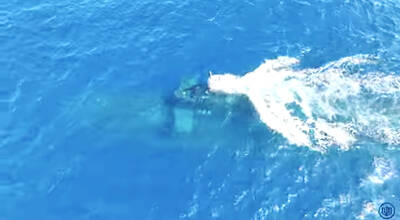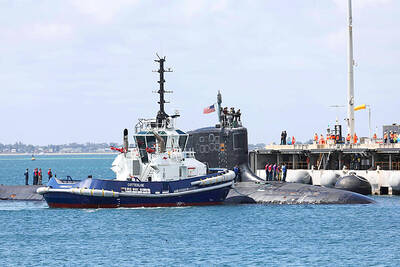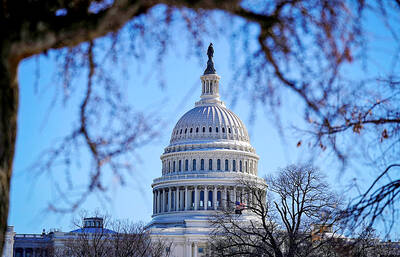A Chinese Nationalist Party (KMT) delegation that will travel to China on Monday should use the opportunity to relay Taiwan's anger over the "Anti Secession" Law to the Chinese leadership, Premier Frank Hsieh (
"It is not appropriate for me to comment on lawmakers' behavior, but I believe that lawmakers will not do something stupid to jeopardize their own reputation and credibility," Hsieh said in the legislature, responding to a question raised by Democratic Progressive Party (DPP) Legislator Hsiao Bi-khim (蕭美琴) about whether KMT Legislator Chiang Pin-kun (江丙坤) picked a good time to visit China.
Despite a rally against the "Anti Secession" Law that is scheduled for this afternoon, Chiang, who is also a KMT vice chairman, is planning to lead a delegation of KMT members to China on Monday.
Hsieh was giving an administrative briefing at the Legislative Yuan yesterday.
"It is OK for him [Chiang] to visit China but I hope that he would help deliver a message on behalf of the Taiwanese people as well, so that Chinese officials will be able to hear our voice clearly and directly -- we are totally opposed to the Anti Secession Law," Hsieh said.
"Some people protest here, some people visit there. It is all for Taiwan's good. I have no problem with that," he said.
Chiang was not present at the meeting yesterday, so lawmakers asked whether Hsieh will meet with him and ask him to forward a message to Chinese officials.
"I think he has heard us at this moment by watching us through the closed-circuit video in his office," Hsieh said.
According to the schedule announced by the KMT last Tuesday, Chiang will be leading a delegation to the Sun Yat-sen Mausoleum in Nanjing and the Mausoleum of the 72 Martyrs in Guangzhou between Monday and April 1.
In the meantime, Yeh Yi-ching (
"Currently, the law does not clearly regulate what kind of activities will be regarded as promoting Taiwan's independence. We need to take advantage of the rally to seek international support. With such support, we can press [Chinese officials] to clarify the grey areas," Hsieh answered. "Otherwise, they will be able to make all kinds of excuses to make a military strike against us any time they want."
KMT Legislator Yang Li-hung (
Hsieh told her that government officials are also Taiwanese citizens, and have the right to speak out. He encouraged his fellow government officials to do so, but he said he did not encourage them to lead the crowd.
"It is everybody's responsibility to do something for the country, including government officials," Hsieh said. "Taking part in the rally is only a sign that we are with the people, instead of leading a protest."
Regarding safety concerns, the premier said that the National Security Bureau will be in charge of protecting the president. In addition, the heads of major security-related offices, including the Ministry of Justice, the Bureau of Investigation, local police departments and the National Police Agency will be on duty to respond to any kind of emergency.
"No problem at all," the premier said.

CSBC Corp, Taiwan (台灣國際造船) yesterday released the first video documenting the submerged sea trials of Taiwan’s indigenous defense submarine prototype, the Hai Kun (海鯤), or Narwhal, showing underwater navigation and the launch of countermeasures. The footage shows the vessel’s first dive, steering and control system tests, and the raising and lowering of the periscope and antenna masts. It offered a rare look at the progress in the submarine’s sea acceptance tests. The Hai Kun carried out its first shallow-water diving trial late last month and has since completed four submerged tests, CSBC said. The newly released video compiles images recorded from Jan. 29 to

DETERRENCE EFFORTS: Washington and partners hope demonstrations of force would convince Beijing that military action against Taiwan would carry high costs The US is considering using HMAS Stirling in Western Australia as a forward base to strengthen its naval posture in a potential conflict with China, particularly over Taiwan, the Wall Street Journal reported on Saturday. As part of its Indo-Pacific strategy, Washington plans to deploy up to four nuclear-powered submarines at Stirling starting in 2027, providing a base near potential hot spots such as Taiwan and the South China Sea. The move also aims to enhance military integration with Pacific allies under the Australia-UK-US trilateral security partnership, the report said. Currently, US submarines operate from Guam, but the island could

RESTRAINTS: Should China’s actions pose any threat to Taiwan’s security, economic or social systems, China would be excluded from major financial institutions, the bill says The US House of Representatives on Monday passed the PROTECT Taiwan Act, which states that Washington would exclude China from participating in major global financial organizations if its actions directly threaten Taiwan’s security. The bill, proposed by Republican Representative Frank Lucas, passed with 395 votes in favor and two against. It stipulates that if China’s actions pose any threat to Taiwan’s security, economic or social systems, the US would, “to the maximum extent practicable,” exclude Beijing from international financial institutions, including the G20, the Bank for International Settlements and the Financial Stability Board. The bill makes it clear that China must be prepared

Taiwanese trade negotiators told Washington that Taipei would not relocate 40 percent of its semiconductor production to the US, and that its most advanced technologies would remain in the nation, Vice Premier Cheng Li-chiun (鄭麗君) said on Sunday. “I told the US side very clearly — that’s impossible,” Cheng, who led the negotiation team, said in an interview that aired on Sunday night on Chinese Television System. Cheng was referring to remarks last month by US Secretary of Commerce Howard Lutnick, in which he said his goal was to bring 40 percent of Taiwan’s chip supply chain to the US Taiwan’s almost